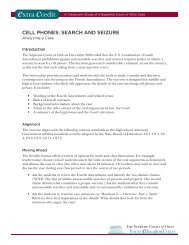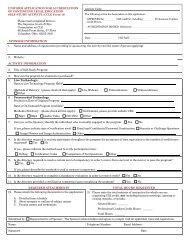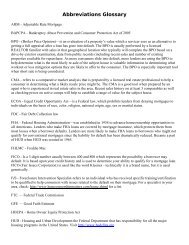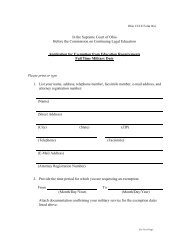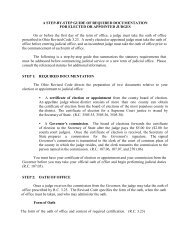Planning for Parenting Time: Ohio's Guide for Parents Living Apart
Planning for Parenting Time: Ohio's Guide for Parents Living Apart
Planning for Parenting Time: Ohio's Guide for Parents Living Apart
Create successful ePaper yourself
Turn your PDF publications into a flip-book with our unique Google optimized e-Paper software.
Child Development and Suggested <strong>Parenting</strong> Schedules<br />
CHILD DEVELOPMENT & SUGGESTED PARENTING SCHEDULES<br />
These schedules take into consideration different kinds of situations<br />
between parents and children. The bond between a parent and child will<br />
continue to grow as long as the parent remains actively involved with the<br />
child. However, some parents may not have had the opportunity to begin<br />
<strong>for</strong>ming that bond. For example, when a schedule includes overnights, it<br />
is presumed that the parent with parenting time not only has care-giving<br />
experience, but also that the child has sufficiently bonded with, and is<br />
used to being in the care of that parent.<br />
BIRTH TO 2 YEARS<br />
Babies learn quickly to love and trust familiar caregivers. Babies become<br />
attached to parents and others through consistent, loving responses, such<br />
as holding, playing, feeding, soothing, talking gently and lovingly,<br />
stimulating, creating bedtime and bath time routines, and prompt<br />
attention to their needs. Babies begin to respond to a range of different<br />
(but equally valuable) types of parenting styles that each parent provides.<br />
Most parents have different ways of parenting. It is helpful if parents<br />
share in<strong>for</strong>mation about how they are parenting the child while the child<br />
is in their care. In addition, parents need to be sensitive to their baby’s<br />
emotional reactions, ability to adjust to changes when going from one<br />
parent to the other, and mood. It helps when parents talk about these<br />
things when making or changing schedules.<br />
Babies cannot remember things they experienced over time – in other<br />
words, “out of sight, out of mind.” There<strong>for</strong>e, it is important that they<br />
have frequent contact with each of their parents and have a stable<br />
schedule and routine. On the other hand, babies do have “emotional<br />
memories” of conflict that can have long-term negative effects, so<br />
parents should not argue when children, even babies, can hear the<br />
arguing. Many babies are sensitive to the tension between the parents at<br />
exchange time, so if you cannot be pleasant to each other, you may need<br />
someone else to help with the exchange times.<br />
23







